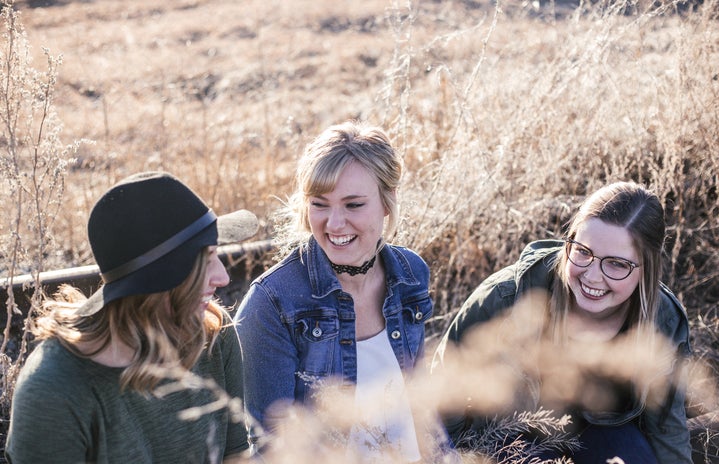With a quick Google search, someone can easily stumble across 100+ great quotes about friendships. Whether it be old friends, new friends, friends who haven’t found each other yet, and even words on how to deal with friendship’s severed ties, the sentiments of friends are everywhere. And that’s a little bit daunting especially as a writer because it feels like everything has already been said, but that’s simply not true.
With Thanksgiving break approaching, this is the first time many of us have gone home to our families and friends. It can be difficult to rekindle a connection if two friends got sidetracked or lost in the workload of school. If you’re looking for a way to reconnect with someone or just make reparations to who you are after a friend breakup, keep reading. In my time, I’ve had my fair share of friendship fallouts, and I’ve always learned a lot from them. Below you’ll find seven steps about things I wish I would’ve known to maintain friendships and some reminders in what could be a difficult time.
This article aims to serve as a helpful guide for if you’re going through a rough time with friends or a resource if that difficult issue ever arises (but I hope not).
-
Don’t wait until it’s too late!
For some of you, this impending friendship break-up has probably been in the works for a while and for others, it may seem like it’s out of left field. Personally, I have experienced both types, and I’m always left with a sinking feeling that if I would have spoken up for the friendship that had been simmering with tension, I could have saved it… but the same could be said for the other person, so keeping that in mind for both respective parties will help keep you level-headed about the scenario. Whatever the circumstance, it’s always best to talk out what feels like awkward tensions. Who knows, it could be the deciding factor in walking away or working it out.
-
Be vocal!
There’s no doubt that I struggled with this step, especially with friends who love the sound of their own voice and don’t heed opinions. That can make it very difficult to explain your side of the story. Remember that your voice is not an accusatory one for asserting your own positions; it takes two to create AND maintain a strong friendship.
-
Consult with other friends!
This may seem counterintuitive because you’re essentially opening up a bond between a pair of friends to scrutiny from other friends. However, this step became pivotal in purging the toxicity of my old friendships. When I looked to my other friends for input about my situation, their advice and compassion gave me the courage and peace of mind to rid bad vibes from my life. Lay out all the facts for the friends you want to confide in, try your hardest to do it without hostility so they can remain (mainly) objective, and listen to their sides of the reasoning. It could be great food for thought in later interactions with the friend you’re feuding with or help aid the process of repairing a bond.
-
Closure is ideal, but it may not always be realistic.
Closure is helpful in instances where two people want to leave a friendship feeling firm on where boundaries are and feel more comfortable having concrete evidence that there’s no going back. For me, it’s always the most craved feeling because I hate being left in limbo on how involved people desire to be in my life. If you state in clear terms how you both feel post-friend breakup, it can be therapeutic to not have lingering questions and unresolved grudges. BUT, if things end badly, it might not be best to agitate the bond in pursuit of a confirmation of a severed tie.
-
Learn when to burn bridges and when to mend fences.
It may seem rational to try for damage control after a friend falling out, especially if the friendship was extensive in the years shared between the two of you. Sometimes, though, it’s okay to burn the bridges and not look back. For me, the biggest issue with cutting out toxic people was worrying about disrespecting all the years we spent when the friendship was good. But as soon as I learned that I could remember those years fondly and still move on, I no longer had an excuse to keep people who weren’t good for me in my life. There will always be some people that are in your life for a finite amount of time, and it’s not bad to appreciate the time spent. They can teach you a lot, especially lessons like the ones I am sharing with you all; but, it doesn’t benefit either party to clutch onto past memories if you neither of you intend to use the bridge again. On the other hand, don’t be so hasty to discard the whole friendship if there are only certain parts that need “mending,” much like a fence.
-
Don’t blame yourself.
I struggle with this still, but it does get easier. It’s human nature for us to want to bear the burden of mistakes as solely an individual thing, but that can be so damaging to our psyche and our recovery process. Now, it’s also not healthy to deny any personal faults or individual grievances that could have affected a friendship falling out, but there are very, VERY few instances where only one person is solely responsible for the disrepair. Assess your involvement as a friend from an objective standpoint because it’s true when they say—we are our own harshest critics.
-
Take time to heal.
Healing is such an individual process, so it’s hard to advise others on the best course of action. I found it beneficial to journal out all the years I spent with a person: the good, the bad, the ugly and then discard the journal completely. I do purge the people from social media and my contacts only so that I don’t reach out in weakness or a time of need. Because you know what? Healing is about what I NEED, and something I do NOT need is a reason to get sucked back into an unhealthy bond at a low point in my life. Don’t feel bad if it doesn’t happen instantaneously because there really is nothing to do but wait for time to fix all wounds. No matter how cliche that sounds, it really is true.
Friendships: they’re an integral part of who we were in the past, who we walk through life with in the here and now, and even people who could shape us later down the line. Regardless of the time frame at which you make these friends, it’s okay to recognize not all friends are forever.
Sources


